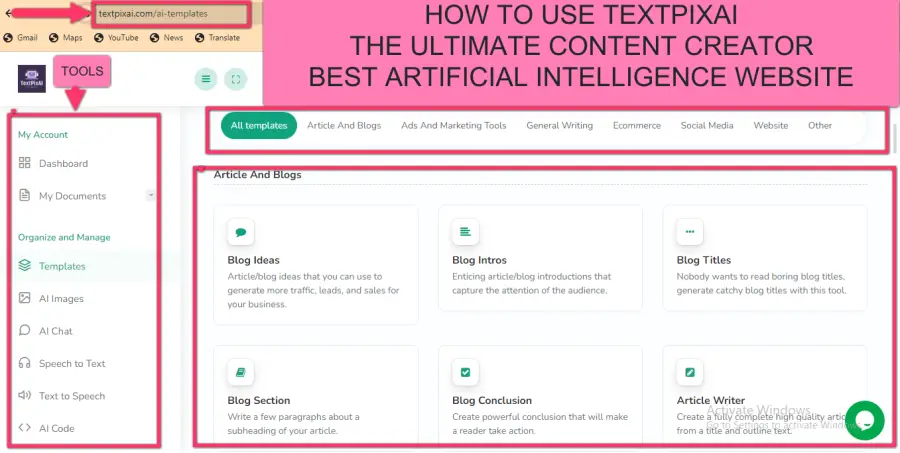AI Applications: Transforming Industries and Society
Introduction
Artificial Intelligence (AI) has emerged as a transformative force in the modern world, revolutionizing the way we live, work, and interact with technology. AI, a field of computer science that focuses on creating intelligent machines capable of mimicking human cognitive functions, has found applications across diverse industries. From healthcare to finance, education to e-commerce, entertainment to agriculture, AI is making remarkable strides. This article delves into the myriad applications of AI, illustrating its profound impact on various sectors of society.
You may also like to read:
AI in Healthcare
Healthcare is one of the most promising domains where AI is making a significant difference, from diagnostics to drug discovery.
Diagnostics and Disease Prediction
AI-Powered Medical Imaging
One of the most notable applications of AI in healthcare is in medical imaging. Traditional radiology and medical imaging methods often rely on manual analysis, which can be time-consuming and subject to human error. AI-powered medical imaging solutions, such as computer-aided diagnosis (CAD) systems, are transforming the field. These systems can analyze medical images, such as X-rays, MRIs, and CT scans, with remarkable accuracy. They assist healthcare professionals in detecting anomalies, identifying diseases, and making faster and more precise diagnoses.
For example, Google's DeepMind has developed an AI system that can analyze retinal scans to detect diabetic retinopathy, a common diabetes-related eye disease. This technology can help in early diagnosis and intervention, potentially preventing blindness in millions of people.
Predictive Analytics in Healthcare
Another crucial application of AI in healthcare is predictive analytics. By analyzing vast amounts of patient data, including electronic health records (EHRs) and genomic information, AI models can predict disease outbreaks, patient readmissions, and even individual patient outcomes. Predictive analytics can aid healthcare providers in identifying high-risk patients, allowing for proactive and preventive care.
For instance, the Mount Sinai Health System in New York has implemented an AI system that predicts patient deterioration up to 48 hours in advance. This early warning system alerts medical staff to intervene, potentially saving lives.
Drug Discovery and Development
Accelerating Drug Discovery with AI
Drug discovery is an arduous and time-consuming process that often takes years and billions of dollars. AI is changing this landscape by accelerating drug discovery and development.
AI models can analyze vast chemical datasets and simulate drug interactions, significantly reducing the time required to identify potential drug candidates. Companies like Atomwise employ deep learning algorithms to predict the binding affinity of various molecules to specific drug targets. This AI-driven approach has the potential to revolutionize drug discovery, making it faster, more cost-effective, and capable of addressing diseases that lack viable treatment options.
Personalized Medicine
Personalized medicine is an emerging field within healthcare that tailors medical treatment to an individual's genetic makeup, lifestyle, and specific health conditions. AI plays a pivotal role in making personalized medicine a reality.
Genomic data, in particular, can be extremely complex and vast, making it challenging for healthcare professionals to derive meaningful insights. AI-driven genomics platforms can analyze a patient's genetic data and provide personalized treatment recommendations. This not only enhances treatment effectiveness but also minimizes adverse side effects.
Telemedicine and Remote Patient Monitoring
Telemedicine, the remote diagnosis and treatment of patients through telecommunications technology, has seen unprecedented growth, especially in recent times. AI-powered telemedicine platforms enable patients to connect with healthcare providers from the comfort of their homes, reducing the need for in-person visits.
Additionally, AI facilitates remote patient monitoring. Wearable devices equipped with AI algorithms can continuously collect and analyze health data, such as heart rate, blood pressure, and activity levels. This real-time monitoring allows for early intervention and better management of chronic conditions.
Ethical Considerations in AI Healthcare Applications
While AI offers tremendous potential in healthcare, it also raises ethical concerns. Privacy and data security are paramount, especially when dealing with sensitive patient information. Moreover, ensuring that AI algorithms are free from biases that could result in health disparities is essential.
AI in Finance
The financial industry has been quick to embrace AI, leveraging its capabilities in various areas, including algorithmic trading and fraud detection.
Algorithmic Trading
High-Frequency Trading
High-frequency trading (HFT) is a strategy that relies on executing a large number of orders at lightning-fast speeds. AI algorithms are particularly well-suited for HFT, as they can analyze market data and execute trades within microseconds, something human traders simply cannot achieve.
Sentiment Analysis
AI-driven sentiment analysis is another significant development in algorithmic trading. By analyzing news articles, social media posts, and other textual data, AI models can gauge market sentiment. This information is invaluable for making informed trading decisions.
Fraud Detection and Prevention
AI-Powered Fraud Detection Models
Fraud detection is a critical concern in the financial industry. AI-powered fraud detection models are capable of identifying suspicious transactions and patterns far more effectively than traditional rule-based systems.
Identity Verification
AI plays a pivotal role in identity verification. Facial recognition technology, often powered by AI, can match a person's face to their official identification photo, enhancing security in various financial transactions.
Customer Service and Chatbots
AI-Driven Customer Support
Many financial institutions have implemented AI-driven customer support chatbots. These chatbots can handle routine inquiries, such as checking account balances or providing transaction history. By automating these tasks, banks can provide faster and more efficient customer service.
Virtual Financial Advisors
AI is also being used to provide personalized financial advice. Virtual financial advisors analyze an individual's financial situation, goals, and risk tolerance to offer tailored investment recommendations. These virtual advisors can assist with portfolio management, retirement planning, and wealth management.
AI in Education
The field of education has witnessed a surge in AI applications, with a focus on personalized learning and educational data analytics.
Personalized Learning
Personalized learning platforms use AI algorithms to adapt educational content to each student's pace and learning style. These platforms can identify areas where students may be struggling and provide additional resources or exercises to reinforce learning.
Intelligent Tutoring Systems
Intelligent tutoring systems (ITS) provide students with personalized tutoring based on their individual needs and progress. These AI-driven systems can offer explanations, quizzes, and feedback, enhancing the learning experience.
Educational Data Analytics
Educational institutions are using AI to analyze large volumes of data, including student performance, attendance, and engagement. This data-driven approach can help identify at-risk students who may need additional support and inform curriculum improvements.
Challenges and Concerns in AI Education
Despite the potential benefits of AI in education, challenges and concerns persist. Ensuring data privacy and security is critical, especially when dealing with student information. Additionally, there is a need to address the potential biases that AI algorithms may introduce into the educational process.
AI in E-commerce
E-commerce companies harness AI's capabilities to enhance customer experiences, optimize supply chains, and prevent fraud.
Recommendation Systems
Recommendation systems are a cornerstone of e-commerce platforms. AI-driven recommendation algorithms analyze user behavior and preferences to suggest products and content tailored to individual customers. This not only increases sales but also enhances user satisfaction.
Collaborative Filtering
Collaborative filtering is a popular recommendation system technique that identifies similarities between users based on their preferences. By analyzing patterns of user interactions, collaborative filtering algorithms can make accurate product recommendations.
Content-Based Filtering
Content-based filtering focuses on the characteristics of products and content. AI algorithms analyze product descriptions, user reviews, and other attributes to recommend items that align with a customer's interests.
Supply Chain Optimization
AI plays a pivotal role in optimizing e-commerce supply chains. Predictive analytics and machine learning algorithms can forecast demand, manage inventory, and streamline logistics. This ensures that products are available when customers want them, reducing costs and improving efficiency.
Fraud Prevention in Online Transactions
Online fraud is a significant concern for e-commerce companies. AI-powered fraud detection systems analyze transaction data in real-time to identify fraudulent activities. These systems can detect unusual purchase patterns, potentially blocking fraudulent transactions before they occur.
AI in Entertainment
AI applications in the entertainment industry encompass content creation, recommendation, and gaming.
Content Creation
AI is increasingly involved in content creation. For example, AI-generated music and art have gained attention for their creativity and originality. Companies like OpenAI have developed models that can compose music, write poetry, and even generate text in the style of famous authors.
AI-Enhanced Film and Video Production
AI also enhances film and video production. AI-driven video editing tools can automatically generate trailers, apply special effects, and even edit footage based on emotional cues. This not only saves time but also opens up creative possibilities.
Content Recommendation
Content recommendation systems are prevalent in the entertainment industry, helping users discover new music, movies, and books. AI algorithms analyze user preferences and behavior to offer personalized recommendations.
Gaming and Virtual Reality
AI plays a central role in gaming, from character behavior and game optimization to procedural content generation. AI-driven NPCs (non-playable characters) can provide challenging and realistic opponents, enhancing the gaming experience. Moreover, virtual reality (VR) and augmented reality (AR) applications are increasingly integrating AI for immersive experiences.
AI in Transportation
The transportation industry is undergoing a revolution, thanks to AI-powered innovations in autonomous vehicles, traffic management, and predictive maintenance.
Autonomous Vehicles
Autonomous vehicles, including self-driving cars and trucks, are at the forefront of AI-driven transportation. These vehicles use a combination of sensors, cameras, and AI algorithms to navigate and make driving decisions. The promise of autonomous vehicles includes increased safety, reduced traffic congestion, and enhanced mobility for individuals with disabilities.
Traffic Management
AI is transforming traffic management in cities worldwide. AI algorithms analyze real-time traffic data, including vehicle location, speed, and congestion levels, to optimize traffic flow. This can reduce commuting times and environmental impact.
Predictive Maintenance for Transportation Systems
Predictive maintenance uses AI to monitor the condition of transportation assets such as trains, buses, and aircraft. By analyzing data from sensors and other sources, AI can predict when maintenance is needed, minimizing downtime and reducing maintenance costs.
Sustainability and AI in Transportation
AI is helping transportation become more sustainable. Electric vehicle (EV) charging networks use AI to optimize charging schedules, while route planning apps can recommend eco-friendly travel options.
AI in Agriculture
Agriculture is benefitting from AI applications that enhance efficiency, improve crop yields, and reduce resource waste.
Precision Agriculture
Precision agriculture employs AI and IoT (Internet of Things) technologies to monitor and manage farming operations with precision. AI-driven drones, for example, can capture high-resolution images of crops, enabling farmers to identify areas in need of irrigation, pest control, or fertilizer.
Crop and Soil Analysis
AI algorithms can analyze images of crops and soil to detect diseases, nutrient deficiencies, and other issues. This information allows farmers to take targeted actions, minimizing the use of pesticides and fertilizers.
Autonomous Farming Equipment
Autonomous tractors and farming equipment are becoming more common, allowing for precise and efficient planting, harvesting, and field management. These AI-driven machines can work around the clock, optimizing farming operations.
AI in Environmental Conservation
AI is playing a crucial role in environmental conservation efforts, aiding in wildlife monitoring, habitat protection, and climate change research.
Wildlife Monitoring
AI-powered camera traps and acoustic sensors help researchers monitor wildlife populations and behaviors. Machine learning algorithms can analyze vast amounts of image and audio data to identify species, track migration patterns, and detect poaching activities.
Habitat Protection
AI is used to protect natural habitats by monitoring deforestation, illegal mining, and other threats. Satellite imagery, analyzed by AI algorithms, provides real-time insights into changes in forest cover and land use.
Climate Change Modeling
AI-driven climate models can simulate and predict the effects of climate change. These models analyze historical climate data, greenhouse gas emissions, and other variables to provide valuable insights for policymakers and researchers.
AI in Space Exploration
Space exploration relies heavily on AI for mission planning, autonomous navigation, and data analysis.
Autonomous Spacecraft Navigation
Space probes and rovers often operate in environments with significant communication delays. AI enables these spacecraft to make autonomous decisions about navigation, obstacle avoidance, and scientific data collection.
Exoplanet Discovery
AI is helping astronomers discover exoplanets (planets outside our solar system) by analyzing massive datasets from telescopes. Machine learning algorithms can detect subtle changes in star brightness caused by transiting exoplanets.
Data Analysis for Space Missions
AI is crucial for processing and analyzing the immense volume of data collected during space missions. From identifying celestial objects to analyzing geological features on distant planets, AI accelerates scientific discoveries in space exploration.
Ethical Considerations in AI
While AI holds immense promise, it also presents ethical challenges and considerations that must be addressed.
Bias in AI
Bias in AI algorithms can lead to discriminatory outcomes, particularly in areas like criminal justice, hiring, and lending. It is essential to develop and implement techniques for identifying and mitigating bias in AI systems.
Privacy and Data Security
The collection and analysis of vast amounts of personal data raise concerns about privacy and data security. Robust data protection measures and transparency in data handling are critical.
Transparency and Accountability
AI systems must be transparent in their decision-making processes. Additionally, establishing accountability for AI-generated outcomes, especially in critical applications like autonomous vehicles and healthcare, is essential.
Conclusion
Artificial Intelligence is a transformative force, impacting nearly every aspect of modern society. Its applications are vast and continue to expand, promising to shape the future in unprecedented ways. However, as AI becomes increasingly integrated into our lives, addressing ethical concerns, ensuring data privacy, and minimizing bias are paramount. With responsible development and thoughtful application, AI has the potential to enhance our quality of life, drive innovation, and address some of the world's most pressing challenges.
References:
-
"Artificial Intelligence in Healthcare." Healthcare Information and Management Systems Society (HIMSS).
-
"Artificial Intelligence in Financial Services." Deloitte.
-
"AI in Education: How AI Is Improving the Education Industry." Analytics Insight.
-
"The Role of AI in E-commerce." Towards Data Science.
-
"Artificial Intelligence in Entertainment." Forbes.
-
"Artificial Intelligence in Transportation." McKinsey & Company.
-
"AI in Agriculture: Present Status and Future Trends." AgriTechTomorrow.
-
"Artificial Intelligence for Wildlife Conservation." One Earth.
-
"AI and Climate Change: How They're Connected and What We Can Do." World Resources Institute.
-
"Artificial Intelligence in Space Exploration." NASA.
-
"AI Ethics: Bias and Fairness." Stanford University.
-
"AI Principles." Google AI.
(Note: This article provides an overview of AI applications and ethical considerations. Please refer to the provided references for more in-depth information on specific topics.)







